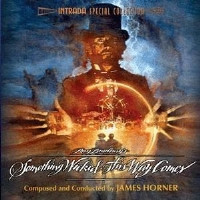- Composed by James Horner
- Intrada / 2009 / 45m
When Ray Bradbury’s Something Wicked This Way Comes finally hit cinemas in 1983, it was the end of a journey that had begun for the author in 1948 when the short story on which it was ultimately based was first published. Working with Disney was apparently a long-held dream for Bradbury, though he probably didn’t much enjoy the tortured post-production on the movie as director Jack Clayton’s vision for the film was radically altered by the studio, including the jettisoning of Georges Delerue’s rich score.
James Horner was a young composer making his name at the time and, while I’m sure he would have been a shade uneasy at the prospect of stepping into the shoes of a master like Delerue, he evidently relished the opportunity it gave him. (It was the one of many occasions in his career when he would step in to replace the score of a beloved composer – a couple of years after this came The Journey of Natty Gann, with Elmer Bernstein the unfortunate party on that occasion.) Horner’s score is resolutely written in his own style, with echoes of various others he wrote within a few months either side of it (Star Trek II, Krull and Brainstorm being the most obvious).
Like Delerue, Horner focused on the contrast between the sinister carnival at the heart of the story (dark, at times macabre music) and the two boys in the town who become the unwitting victims of the carnival leader Mr Dark (who get innocent, beautiful pastoral music) and there are other, superficial similarities between the two scores (particularly in some of the instrumentation) but they are quite different works, which is surprisingly not the case all that often in these cases. Horner’s score is if anything even more psychological in nature than Delerue’s, it’s certainly more unnerving, but unsurprisingly it doesn’t have the knockout emotional themes of the French master (Horner would go on to excel in that area himself later in his career, but not quite at this stage).
The score begins with mysterious piano leading into an orchestral storm at the start of the main title, with the score’s main theme presented very early on, an imposing but simple melody, always slightly off-kilter. It’s not long before Horner gives it a more playful side, but that doesn’t last. But from that darkness comes a slice of warm, pastoral Americana as the composer introduces his beautifully lilting theme for the boys – it’s pretty exuberant music (not actually unlike some of what the composer would write for Natty Gann) and the same theme forms the basis of the later “The Boys Buy a Lightning Rod” (a softer, more playful arrangement) and the gorgeous end titles, which (like – coincidentally? – Delerue’s score) has a lovely harmonica solo.
It’s the darker side of things that really dominates though – “Dark’s Pandemonium Carnival” features a strident version of the main theme, along with great colour provided by female choir (another touch carried over from the rejected score, though the two composers’ approaches to using it are very different) – ghostly howls, ghastly shreeks. That piece also introduces some suspense material straight out of Star Trek II, which fits the tone of the score well. Later on, the choral effect reaches its zenith in “Magic Window”, somehow both mysteriously alluring and quite disturbing. “The Carousel” is another piece which is distinctly unsettling, Horner blending his horror/suspense style with some twisted calliope music (running backwards, reflecting what’s happening in the film) – it’s probably one of the more avant garde pieces he wrote for film.
“Miss Foley in the Mirror” is a great piece, travelling briefly through light before returning very much to the dark side, with some terrific suspense material. The score’s longest cue, the seven-minute “The Library”, is mostly suspense too, this time subtler, Horner tugging gently to provoke an uncomfortable feeling. A passage where silky strings play under the spooky chorus and unsettling piano is just masterful. “Side Show” is twisted belly dancer music, a macabre choral twist being injected half way through, before the first real action music appears in “Discovered”, and it’s really strong. This leads into “The Spiders” which is in full-on horror music style, piercing orchestral bursts punctuating creepy strings and xylophone.
In keeping with virtually everything he did at the time (or, I guess, any other time) Something Wicked This Way Comes is a bold and confident work by James Horner, full of a lot of his signatures. It’s not quite the masterpiece level of the three contemporary scores I named at the end of the second paragraph, but this was such a rich period for the composer and there is so much to explore in all these works. Intrada’s 2009 album marked the score’s debut on album and is sadly out of print now, but it’s a really strong one (presented out of film order, improving the listening experience, something which would never have happened had Horner not personally been involved in the release) and hopefully will be re-released some day for more people to discover.
Rating: ****
Also see: Something Wicked This Way Comes (rejected) Georges Delerue
facebook.com/moviewave | twitter.com/MovieWaveDotNet | amazon.com













I think Delerue’s score is more psychological. Perhaps it’s due to Horner’s album arrangement, but that score more evenly balances the lightness and darkness. Delerue’s is more sad and oppressive, with the lighter children’s theme incorporated sparingly.
Like you, I do wish Intrada will do an expanded release of this score. It is a true gem among the masterpieces Horner crafted during the 1980s.